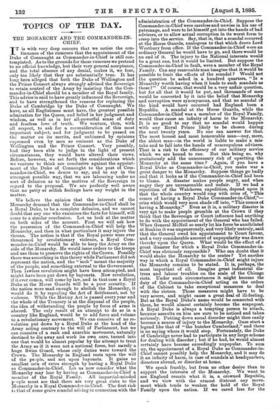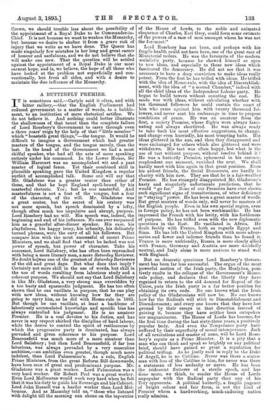TOPICS OF THE DAY.
THE MONARCHY AND THE COMMANDER-IN- IT is with very deep concern that we notice the con- tinuance of the rumours that the appointment of the Duke of Connaught as Commander-in-Chief is still con- templated. As to the grounds for these rumours we pretend to no official knowledge, but their very general acceptance, and the total absence of any denial, makes it, we fear, only too likely that they are substantially true. It has long been alleged that both the Duke of Wellington and the Prince Consort always strongly advised the Sovereign to retain control of the Army by insisting that the Com- mander-in-Chief should be a member of the Royal family. This advice is said to have greatly influenced the Sovereign, and to have strengthened the reasons for replacing the Duke of Cambridge by the Duke of Connaught. We have, as all Englishmen must have, the greatest possible admiration for the Queen, and belief in her judgment and wisdom, as well as in her all-powerful sense of duty and fearless love of truth. We venture, then, -with all respect, to ask for a reconsideration of this most important subject, and for judgment to be passed on the matter on its merits, and unbiassed by opinions expressed even by men so eminent as the Duke of Wellington and the Prince Consort. Very possibly, had they been able to judge in the light of present circumstances, they would have altered their views. Before, however, we set forth the considerations which we venture to think are conclusive against the appoint- ment of the Duke of Connaught to the post of Com- mander-in-Chief, we desire to say, and to say in the strongest possible way, that we are labouring under no sort of delusion as to the motives of the Sovereign in regard to the proposal. We are perfectly well aware that no petty or selfish feelings have any weight in the matter.
We believe the opinion that the interests of the Monarchy demand that the Commander-in-Chief shall be a Royal Duke, to be a complete delusion, and we cannot doubt that any one who examines the facts for himself, will come to a similar conclusion. Let us look at the matter on both sides of the account. First we will ask how the possession of the Command-in-Chief will help the Monarchy, and then in what particulars it may injure the throne. The notion is that if the Royal power were ever threatened by revolutionary violence, a Royal Com- mander-in-Chief would be able to keep the Army on the side of the Monarchy. He would issue orders to the troops and use them to preserve the rights of the Crown. Possibly there was something in this theory while Parliament did not represent the nation, and the " mob " meant the majority of the people, and something external to the Government. Then lawless revolution might have been attempted, and might have been put down by bayonets. Now revolution, if it ever comes, will come by law, and in that case a Royal Duke at the Horse Guards will be a poor security. If the nation were mad enough to abolish the Monarchy, it would do it by repealing the Act of Settlement, not by violence. While the Mutiny Act is passed every year and the whole of the Treasury is at the disposal of the people, the idea of withstanding the people by force of arms is absurd. The only result of an attempt to do so in a country like England, would be to add force and volume to a revolutionary movement. We can conceive of no re- volution put down by a Royal Duke at the head of the Army acting contrary to the will of Parliament, but we can conceive of a rash and anarchic movement, naturally destined to die away and work its own cure, turned into one that would be almost popular by the attempt to treat the Army as if it were not a national force, but merely a huge Swiss Guard, whose only duties were toward the Crown. The Monarchy in England rests upon the will of the pe.iple, and not upon bayonets. It gains no smallest iota of extra strength by having a Royal Duke as Commander-in-Chief. Let us now consider what the Monarchy may lose by having as Commander-in-Chief a member of the Royal Family. All impartial-minded p .ople must see that there are very great risks to the Monarchy in a Royal Commander-in-Chief. The first risk that of some grave scandal arising in connection with the administration of the Commander-in-Chief. Suppose the Commander-in-Chief were careless and unwise in his use of patronage, and were to let himself get into the hands of bad advisers, or to allow actual corruption in its worst form to creep into the service. Say, that is, that a scandal occurred at the Horse Guards, analogous to that which drove Lord Westbury from office. If the Commander-in-Chief were an ordinary General he would have to go, and there would be an end of it. The injury to the National interests would be a great one, but it would be limited. But suppose the Commander-in-Chief in fault, were a member of the Royal Family. Can any reasonable man imagine that it would be possible to limit the effects of the scandal ? Would not the question be asked in a hundred quarters, "Is a Monarchy worth having when it leads to such scandals as these ? " Of course, that would be a very unfair question, but for all that it would be put, and thousands of men would be converted by it into the belief that Monarchy and corruption were synonymous, and that no scandal of the kind would have occurred had England been a Republic. A scandal at the Horse Guards, while the Commander-in-Chief was a member of the Royal Family, would thus cause an infinity of harm to the Monarchy. It is no good to say that no scandal would happen with any Royal Prince likely to be chosen during the next twenty years. No one can answer for that. The most honest and most honourable man—nay, more, the ablest man—in the world is liable to make a mis- take and to fall into the hands of unscrupulous advisers. That is a risk to the efficiency of our military service which we are bound to run. But this being so, why gratuitously add the unnecessary risk of upsetting the Monarchy at the same time ? Again, if you have a Royal Duke as Commander-in-Chief, you make war a great danger to the Monarchy. Suppose things go badly and that it looks as if the Commander-in-Chief had been to blame. A disaster makes people angry, and when angry they are unreasonable and unfair. If we had a repetition of the Walcheren expedition, depend upon it that the whole country would ring with cries of, "This comes of having a Royal Duke Commander-in-Chief,"- cries which would very soon shade off into, "This comes of having a Monarchy." Even as it is, a military disaster is very apt to make people grumble at the Crown if they think that the Sovereign or Court influence had anything to do with the appointment of the General who has failed. When General McNeil so nearly let his force be annihilated at Suakim it was ungenerously, and very likely untruly, said that the General owed his appointment to Court favour, and a very considerable amount of unpopularity was drawn thereby upon the Queen. What would be the effect of a great disaster for which a Royal Duke Commander-in- Chief was obviously responsible ? Who can doubt that it would shake the Monarchy to the centre ? Yet another way in which a Royal Commander-in-Chief might injure the Monarchy remains to be stated. It is, perhaps, the most important of all. Imagine great industrial dis- tress and labour troubles on the scale of the Chicago riots. Under such circumstances it might become the duty of the Commander-in-Chief acting on the orders of the Cabinet to take exceptional measures to deal with the rioters. Those measures might have to be very severe, and might cause a great deal of ill-feeling. But as the Royal Duke's name would be connected with them, he would almost certainly become the scapegoat. A Royal Duke is always a tempting person to attack, because assaults on him are sure to be noticed and taken seriously. Putting down social disorder might then easily become a source of injury to the Monarchy. Once start a legend like that of "the butcher Cumberland," and there is no saying where it would stop. Fortunately, the Duke of Cambridge never had to participate in any large scheme for dealing with disorder ; but if he had, he would almost certainly have become exceedingly unpopular. To sum up, the appointment of a Royal Duke as Commander-in- Chief cannot possibly help the Monarchy, and it may do it an infinity of harm, in case of scandals at headquarters, disasters abroad, or disorder at home.
We speak frankly, but from no other desire than to support the interests of the Monarchy. We want to see England remain what it is, a crowned Republic, and we view with the utmost distrust any move- ment which tends to weaken the hold of the Royal Family upon the nation. If we cared less for the Crown, we should trouble less about the possibility of the appointment of a Royal Duke to be Commander-in- Chief. It is not because we want to weaken the Monarchy, but because we desire to shelter it from a grave risk of injury that we write as we have done. The Queen has made singularly few mistakes in her long and great career of honour and usefulness, and we do not believe that she will make one now. That the question will be settled against the appointment of a Royal Duke is our most earnest hope, and is, we believe, the hope of all those who have looked at the problem not superficially and con- ventionally, but from all sides, and with a desire to maintain the due influence of the Monarchy.



































 Previous page
Previous page